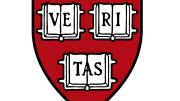Donald Revell will be the poet, and Andrea Barrett the orator, at the Phi Beta Kappa (PBK) Literary Exercises—the first formal community event of Commencement week and, in many respects, the intellectual core of the festivities for College seniors and their families. Students elected to PBK will also honor faculty members for outstanding teaching during the ceremony. The exercises are scheduled for 11 a.m. on Tuesday, May 27, in Sanders Theatre.
A Mystical Poet
Born in the Bronx, Revell is best known for his first collection of poems, From Abandoned Cities (1983), a National Poetry Series winner. Although originally a formalist poet, his more recent work tends to be in free verse and has moved toward “a yearning for transparency and innocence,” according to his biography on the Poetry Foundation website. Immersed in the work of Henry David Thoreau and William Carlos Williams, Revell’s poetry is “seriously Christian but not doctrinaire, mystical without setting intellect aside, angry over political matters without ever growing stale or shrill, and more often joyful than any other living poet of his powers,” writes critic and Harvard professor of English Stephen Burt in that profile, noting that in A Thief of Strings (2007), Revell “may have constructed the only language of ecstasy that makes sense for our secular, self-doubting age.”
“If I were in charge of [graduate-school] admissions, I'd replace the GRE with a simple test: Make a good bowl of soup,” Revell said in an interview with “Poets and Writers” in 2002. “In my workshops, we work simply to cut out any lines or phrases that are not literally true. We ask the poem to stand by its words. We ask each other to stand by our words. We urge one another to be good, trusting the poems to follow suit. Only a good human can write a good poem.”
Revell, who teaches at the University of Nevada, Las Vegas, won the 2004 Lenore Marshall Award and is a two-time winner of the PEN Center USA Award in poetry. He has also received the Gertrude Stein Award, two Shestack Prizes, two Pushcart Prizes, and fellowships from the National Endowment for the Arts, as well as from the Ingram Merrill and Guggenheim Foundations. His most recent books include The Bitter Withy (2009) and a translation of Arthur Rimbaud’s A Season in Hell (2007).
An American Novelist
Well known as a writer of historical fiction, Barrett was born in Boston and began writing seriously in her thirties, but remained relatively unknown until Ship Fever, a collection short stories, won the National Book Award in 1996. Barrett’s work reflects her lifelong interest in science—particularly women in science; many of her characters are nineteenth-century biologists. She was awarded a MacArthur Fellowship in 2001.
As in the work of William Faulkner, some of her characters appear in more than one story or novel, according to her website: “Although each novel and story is self-contained, the reader comprehends an added dimension when familiar with the characters’ previous histories.” Discussing what made her become a writer, she told The Paris Review in 2003:
I’ve never known a writer who didn’t feel ill at ease in the world. Have you? We all feel unhoused in some sense. That’s part of why we write. We feel we don’t fit in, that this world is not our world, that though we may move in it, we’re not of it. Different experiences in our lives may enforce or ameliorate that, but I think if they ameliorate it totally, we stop writing. You don’t need to write a novel if you feel at home in the world. We write about the world because it doesn’t make sense to us. Through writing, maybe we can penetrate it, elucidate it, somehow make it comprehensible. If I had ever found the place where I was perfectly at home, who knows what I would have done? Maybe I would have been a biologist after all. No great loss if that had been the case, but it didn’t work out that way.
Barrett was a finalist for the 2003 Pulitzer Prize for Fiction for Servants of the Map, and in 2013, her novel Archangel was a finalist for the 2013 Story Prize. Her fiction and essays have been selected for Best American Short Stories, Best American Science Writing, Best American Essays, the PEN/O. Henry Prize Stories, and other anthologies. She teaches at Williams College and in the Warren Wilson College MFA Program for Writers in North Carolina.









